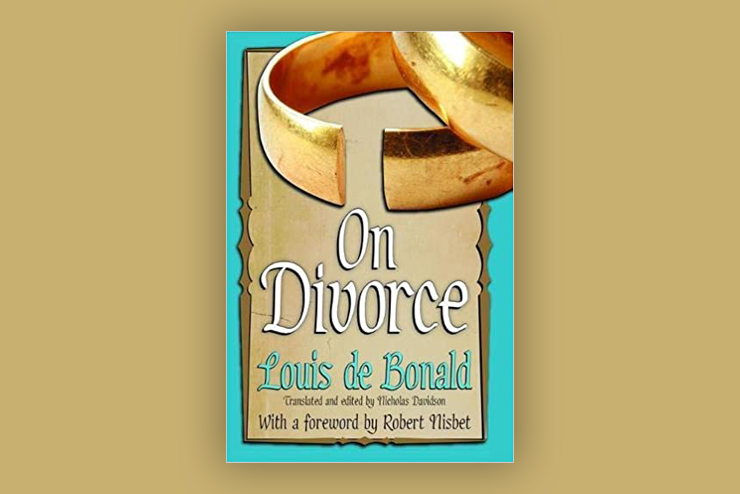Marriage and divorce. Is there any topic on which it is easier to find self-professed conservatives who somehow cannot bring themselves even to seriously contemplate the truly conservative position than this one? Louis de Bonald’s On Divorce remains, more than 200 years after its first publication, the most profound and philosophically sound argument for the indissolubility of marriage yet produced.
Bonald rejects outright the individualist, social contract conception of man from which, today, nearly all—including many who identify as conservatives—begin their discussion of the nature of social relations. Man should be conceived of not fundamentally as an individual, but as a unit in a family, Bonald argues. It is this organic, eternal institution that is the basic space of life for a species like ours, which is born so precociously and incapable of even basic self-preservation, much less the higher moral functions.
If instead we accept the individualist basis of human nature, the materialist framework of the alienated Homo economicus cannot be evaded. All soon becomes a question of “what is in it for me?” Any relation that does not fit that calculation must be removed as an impediment.
What does it matter, Bonald inquires, “if a few individuals suffer in the course of this transient life, as long as reason, nature, and society do not suffer?” Marriage is not a contract or a friendship pact between individuals, but a collective entity that has as its end an essential function: the reproduction of the human race. The extremity of his argument is an invigorating slap in the face to our age of queasy moral tranquilization and stupor. Such an ideal may not be fully attainable, but if we will not even aim for it, then the game is already up.
That children are not consulted before a family is dissolved is the clearest sign of the injustice of the contractual view of marriage. The most basic principle of the liberal logic of contract is not adhered to in the case of its most vulnerable members, who are treated as nonpersons. Few children would willingly acquiesce to the divorce of their parents and their interests matter.
On Divorce is hearty stew for the conservative soul. Note well that Bonald wrote it in the days just after the Revolution’s Terror had subsided. Within a decade and a half, the monarchy had been reinstated, and Bonald spearheaded a movement that abolished divorce in 1816. It remained so until nearly the last decade of the 19th century. That is a remarkable success from a starting point of devastating disadvantage, and an embattled reactionary cannot but be encouraged by it.

Leave a Reply